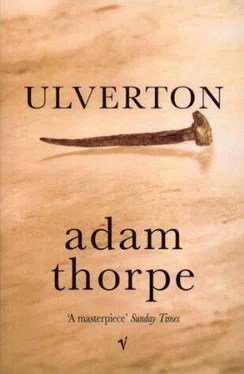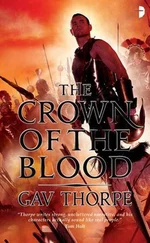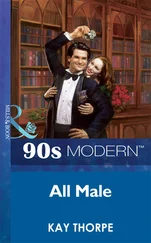The Squire grinned and adjusted his pince-nez, and my fondness for him was as the melting snow. Suffice to say that a few more shovelfuls of the poorest quality coal, and the blaze was undousable. Another great roar, a shifting and shoving about, and suddenly there they were — the spoils of eloquence: thirty-two strapping fellows (well, most of them were strapping) in a neat line between the people and the podium. They shifted from foot to foot, they tossed pebbles from one hand to the other, they scratched their noses, they grinned ostentatiously at loved ones. I thought of Carlyle’s dictum, that ‘there is nothing in the world you can conceive so difficult, as that of getting a set of men gathered together as soldiers’. I reflected: here are a group of agricultural labourers, or whatever, in their Sunday best, which was not saying a great deal, who would no more ‘walk into the cannon’s mouth’ for one man as they would wipe their dirty boots on entering the scullery — and yet in a few months or so, that is exactly what they will be doing. I remain with ‘cannon’s mouth’, for my notions of war were then as outmoded, dear reader, as the flashing sabre was — and if you were to conquer the temporal flux, and return as you are to that square, and stand beside me and whisper of all that you now know — of spitting machine-guns and lumbering metal monsters, of men cut down like fairground toys, of hideous waste in a universe of sucking mud, of gas and shrieks and drowning horses — I should think of you as utterly mad!
For did not the poignancy of that moment clutch even at my cynical heart? India and my wife’s death had not quite corroded all my softer faculties, I fear: a faint tinge of pride, that my newly-adopted home had pipped Bursop by two runs, as it were, crept into my visage. My mouth found itself curving into a satisfied smile, my head nodded at the frumpy lady to my right, and the cantankerous gent to my left, and for a moment I was sealed in tight with the lot of them.
It was at that moment that I realised, with an unwarranted jump to the heart, that Trevick and the other ‘diggers’ were absent. This thought was all but instantaneous with a sudden concern that all our barrow ‘team’ would be despatched forthwith to Flanders. There was a flurry, a straightening of backs, a darting in and out from under a black cloth, a shuffling of the three Important Persons into a group beside the Sacrificial Lambs, and the flashlight exploded like a tiny bomb, making the Vicar jump a little, which explains why his face is a thankful blur, his deadly role forgotten to history (I have the photograph before me now). I fretted at the absence of my companions on the barrow. An awful truth began to dawn upon me. And as this livid light rose in my mind, I saw Percy Cullurne leaning against the water-pump that dribbled into its trough between the podium and the New Inn, and is still tenaciously known as ‘The Well’; he was cupping a handful of water to his mouth. The line of men were having their hands shaken by the Major, and the crowd were waiting for the next stage in the proceedings. The Major stepped onto the podium for a final address. There was quiet. Then as he opened his mouth there was a squeak from the water-pump, then another: it had (and still has) an infernal squeak. Percy Cullurne had a hot face, and was bathing it, snorting and shaking his great wide head. I was reminded of the baptism of our Lord, for some reason. Anyway, there was a hint of purification about the action.
The Major turned; the Squire turned. Up to that point the Squire had not noticed Percy Cullurne. Now all eyes were turned on Percy Cullurne. Percy Cullurne stood upright and saw us watching him. He scanned our eyes and shook his hands free of water, as he had done on that very spot thousands of times before, I am sure. He sniffed. He spat, though not in anger: it was a practical, working-man’s expectoration. He sniffed again and passed a hand across his mouth. Every action of his had become entrancing. One almost expected him to start dancing and singing, as in the music-hall, or produce a rabbit from his cloth-cap (needless to say, Percy Cullurne was not in his Sunday best). But then he fell still, and merely stared us back. It was our turn to move.
‘Ah!’ came from the Major. The Major thought that enough, evidently.
The Squire had no choice. Anyway, his Furies were at him. His moment of personal glory was crumbling before his very eyes. He cleared his throat. He could, with a great effort of will, have turned his back, and said nothing. ‘The greatest events,’ as Fielding puts it, ‘are produced by a nice train of little circumstances.’ How different things might have been then!
‘Ah!’ came from the Squire.
Percy Cullurne cocked his head slightly, like a faithful dog who has just received an unfamiliar command.
‘Cullurne,’ said the Squire. He lifted his chin up, and placed his small hands behind his back, and rocked to and fro on his heels. His hair-oil gleamed in a decent imitation of St Michael’s helmet.
‘There’s a place at the end, Cullurne. Make it thirty-three.’
The crowd murmured its approval, along with one or two shouts from smocks, to the effect that Percy could stop a regiment with two fingers, if he could find them — which from the laughter that followed was clearly not meant to be complimentary; but its probable vulgar import, hidden in the multiple folds of village irony, was wholly lost on me. Percy Cullurne rested an elbow against the pump and continued to stare at us with nothing but puzzlement showing across his features. The frumpy old lady to my right leaned across in front of me to the cantankerous gent on my left and whispered, ‘Village idiot!’ To my shame, I did not flick her hat off, but merely wrinkled my nose at the stench of naphthalene, and emphatically cleared my throat.
Small beads of perspiration began to run down the Squire’s nose. He compressed his lips and puckered them in and out, like a child about to cry (‘bivering’ — as the local dialect rather charmingly has it). He looked anxiously about him for what I could only imagine was an escape route. Fury was grappling with a sense of absolute funk. This was extraordinary. His fingers locked themselves behind his back, then writhed. I believe to this day that he knew he was defeated. Percy Cullurne had probably terrified him for years, though he was twice Cullurne’s age, and of course immeasurably superior in social position. I know men of impeccable breeding who live in abject fear of a particular domestic servant (often the butler). It is, I think, a need, a profound desire, acting within them. Percy Cullurne has never grappled with himself. He is, in one way, as insentient to his own soul as a plant or a tree because he has never felt a need to query that inner self. His soul is commensurate with desire: his desire is his soul, and the soul remains content merely to be.
‘Come on man,’ said the Squire, ‘come on.’
Cullurne passed a big hand across his big face, which appeared to wipe away the puzzlement, pushed himself off from the pump and began to walk towards us. It was a space of only some thirty yards, but his slow, shambling gait, the ease of his great limbs, the utter silence that surrounded the strike of his iron-shod heels against the hard ground, the sudden shattering of a big dry whorl of horse-dung by an oblivious boot, his long shadow dancing over the stony earth — all this made his progress as slow as a Titan’s, as if a figure from some Homeric bronze-hammered past had loomed, had risen again into our midst. I can’t honestly say now whether I knew what he was about to do: perhaps all of us thought he would shuffle onto the end of the line, to a cheer no doubt, and the meeting would have been accounted a great success. Whatever Cullurne was or was not to do, we knew we would never forget that slow, methodical advance towards us, transfixing time itself; bespeaking slow, hard hours in the field, or in the dusty barn, or in the great lavish garden of the Manor; and arresting, for a long minute, our madness.
Читать дальше










